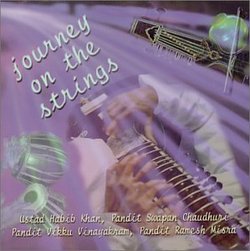Reminds one why rock went raga
Johann Cat | 04/09/2005
(4 out of 5 stars)
"If it is a cliché that Indian music blends spiritual uplift and a sweet, libidinous surge, not unlike some kinds of gospel, blues, and rocknroll, well, let it be, because this is a great example of Indian music as sexy and meditative at once. This is an instrumental, "orchestral" record with sitar and Indian string instruments prominent (no violin/ cello sections, mind you) that occasionally rocks, I kid you not.
The track called "Butterfly" is one of the best rocknroll numbers I have heard in the last year--it compares to something like "When the Levee Breaks" by Led Zeppelin in its drive and emotional scope, uniting a massive, repeated riff to great Indian drum work. This record not only makes one feel, unembarrassedly, like he's at a party at George Harrison's house in 1967, but it reminds one of just WHY rock become fascinated with Indian music: it can be full of scintillating layers of percussion, with urgent deep notes and emotive string work, absent guitars, that will rock your socks off. This is also very happy music without being maudlin; despite its very real instrumental sophistication, the whole experience is closer to a free garage band than to a paid evening with the Boston Symphony. And lest I misrepresent this, it is also quiet and soothing enough in many places for tea and conversation, too."


 Track Listings (6) - Disc #1
Track Listings (6) - Disc #1